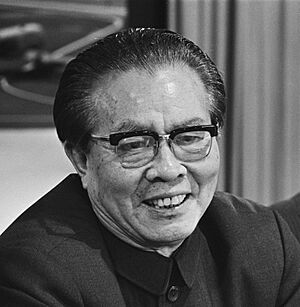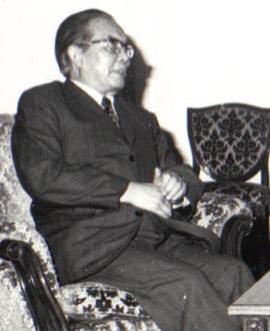Huang Hua facts for kids
Quick facts for kids
Huang Hua
|
|
|---|---|
|
黄华
|
|

Huang in 1978
|
|
| Vice Premier of the People's Republic of China | |
| In office 10 September 1980 – 4 May 1982 |
|
| Premier | Zhao Ziyang |
| 5th Minister of Foreign Affairs | |
| In office 3 December 1976 – 19 November 1982 |
|
| Premier | Hua Guofeng Zhao Ziyang |
| Preceded by | Qiao Guanhua |
| Succeeded by | Wu Xueqian |
| Permanent Representative of China to the United Nations | |
| In office 2 November 1971 – 29 November 1976 |
|
| Preceded by | Liu Chieh (representing the Republic of China) |
| Succeeded by | Chen Chu |
| Personal details | |
| Born |
Wang Rumei
January 25, 1913 Ci County, Zhili, Republic of China |
| Died | November 24, 2010 (aged 97) Beijing, People's Republic of China |
| Political party | Chinese Communist Party |
| Spouse | He Liliang (何理良) |
Huang Hua (born January 25, 1913 – died November 24, 2010) was an important Chinese leader. He was a politician and a diplomat. He helped China connect with other countries.
Huang Hua served as China's Foreign Minister from 1976 to 1982. At the same time, he was also a Vice Premier from 1980 to 1982. He played a key role in starting official relations between China and the United States. He also helped China form ties with Japan. Huang Hua was deeply involved in talks with the United Kingdom about the future of Hong Kong.
Life Story of Huang Hua
Huang Hua was born as Wang Rumei in Ci County, Hebei Province, in 1913. His studies were interrupted because of the Chinese Civil War. This was a big conflict in China. He then continued his education in northeast China. This area was invaded by Japan in 1931.
In 1932, he joined Yenching University in Beijing. He was one of the first students there. He became very good at English. He also became close friends with John Leighton Stuart. Stuart was an American missionary who started Yenching University. Huang Hua also read books about communism. This led him to support the idea of communism.
Joining the Communist Party
In 1936, Huang Hua joined the Chinese Communist Party (CCP) while at Yenching University. He started using the name Huang Hua. Later that year, he traveled with an American journalist named Edgar Snow. They went to a special area called Yan'an. This was a base for the Communists. Huang Hua helped Snow talk to Communist leaders, including Mao Zedong.
Edgar Snow later wrote a famous book called Red Star Over China. This book told the world about the Chinese Communists. After Snow left, Huang Hua stayed in Yan'an. He worked as an assistant to important military leaders. These included Marshal Zhu De and Marshal Ye Jianying.
During a time called the Yan'an Rectification Movement, Huang Hua faced a problem. Another party member reported him for using an official seal without permission. But because Marshal Zhu De protected him, Huang Hua avoided serious trouble. In 1944, the United States sent a group to Yan'an. They wanted to learn about the CCP and its army. Huang Hua was in charge of translating for this group. He also translated for US Army General George C. Marshall during peace talks in China.
Working for New China
After the CCP took over Nanjing in April 1949, Huang Hua went there. His job was to take over the old government's foreign ministry. He sent important documents to Beijing. Mao Zedong also allowed him to meet with John Leighton Stuart. Stuart was the US Ambassador to China at the time. However, their talks did not succeed.
Mao Zedong announced the creation of the People's Republic of China on October 1, 1949. Huang Hua's excellent English skills helped him get a job. He joined the new Ministry of Foreign Affairs. He first worked in Nanjing, then moved to Shanghai to handle foreign affairs there. In 1953, he helped with the talks to end the Korean War. He also made the first contacts with the United States in Warsaw, Poland, in 1958.
During the 1960s, Huang Hua worked abroad as an ambassador. He served in Ghana and then in Egypt. By 1967, he was China's only ambassador still working overseas. This was because of a period called the Cultural Revolution in China. When he returned home, he and his wife were arrested. They were sent to work in the countryside. But his exile did not last long. He was allowed to return to his work in 1970. He even translated for Mao Zedong during an interview with Edgar Snow in August 1970.
Starting in 1971, Huang Hua became the first official representative for the People's Republic of China at the United Nations. This happened after China's seat at the UN was given to the mainland government. Huang Hua also signed an important agreement with Japan. This was the Treaty of Peace and Friendship between Japan and China on August 12, 1978.
After Mao Zedong died in 1976, Huang Hua became the Foreign Minister. He joined Chinese leader Deng Xiaoping on his important trip to the United States in January 1979. This trip led to China and the US officially starting diplomatic relations. Huang Hua also attended a big meeting called the North–South Summit in 1981. He was with Premier Zhao Ziyang at this summit.
When Soviet leader Leonid Brezhnev died in November 1982, Huang Hua attended the funeral. He praised the Soviet leader and hoped for better relations with Moscow. This was during a time called the Sino-Soviet split. China and the Soviet Union were competing for influence. After returning to China, Huang Hua was replaced as Foreign Minister by Wu Xueqian. However, Huang Hua continued to be active in "friendship diplomacy." He met with Henry Kissinger during the 2008 Summer Olympics in Beijing. Huang Hua passed away on November 24, 2010, at the age of 97.
Family Life
In 1944, while in Yan'an, Huang Hua married He Liliang. She was born in July 1926. They had two sons and one daughter together.
 | Bessie Coleman |
 | Spann Watson |
 | Jill E. Brown |
 | Sherman W. White |


